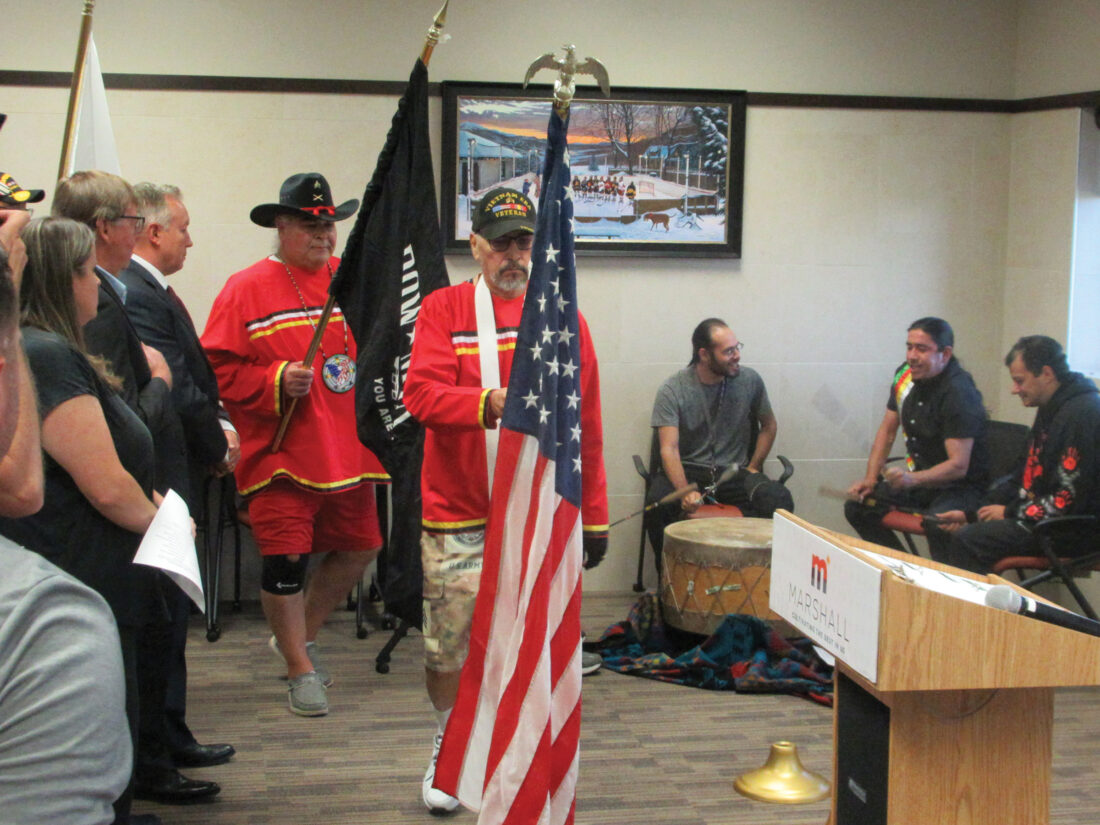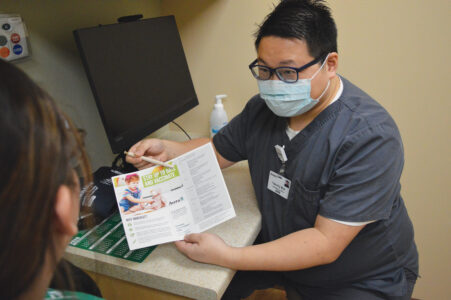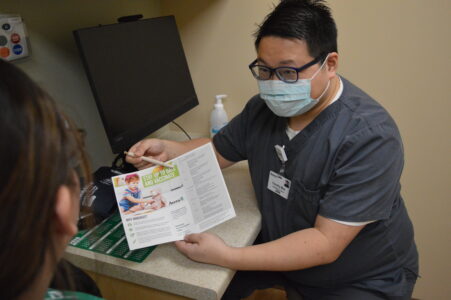Reaching out to vets in crisis
‘Be the One’ app a tool to help prevent suicides

Photo by Deb Gau The seventh annual Minnesota Veteran Suicide Prevention and Awareness Day opens with the presentation of the colors at the Red Baron Arena and Expo in Marshall. The Lower Sioux Color Guard, the Marshall American Legion Color Guard, and the Red Tree Singers conducted the ceremony.
MARSHALL — It can be hard to know what to say when someone you know is thinking about suicide. Tim Engstrom said he experienced that situation firsthand when a fellow military veteran reached out to him over the phone.
Engstrom said there were some things about their conversation that worried him.
“And the fact that he was calling me and we didn’t have regular contact was a concern,” he said. Engstrom, communications director for the American Legion Department of Minnesota, turned to “Be the One,” a phone app created by the Legion to help veterans and other people in crisis.
“Although I didn’t use the app questions in order, the app helped me use the right language to ask questions, and continue the conversation,” he said.
Reaching out to veterans in crisis was a focus of a Minnesota Department of Veterans Affairs event in Marshall on Saturday. MDVA and resource organizations from around the region gathered to mark the seventh annual Veteran Suicide Prevention and Awareness Day at the Red Baron Arena and Expo.
“Minnesota loses about 100 veterans every year to suicide,” said Eric Meittunen, MDVA deputy commissioner of veterans health care. “We are committed to addressing this tragedy, both by supporting veterans when they are in crisis, but also prioritizing wellness and mental health of the veterans and their families in our communities.”
Saturday’s event was a chance to spread the word about support resources available for veterans and other rural Minnesota residents, said Brad Pagel of the Slayton American Legion post.
“It’s awareness, to let them know that the resources are here,” Pagel said.
There’s definitely a need for mental health and other resources in southwest Minnesota, he said.
“But not a lot of people know resources are available out here,” he said.
Although the program Saturday focused on veterans, Pagel said many support resources are there for people of all ages, and not only veterans.
Speakers at the program, like Engstrom, shared some of the different tools available to help people reach out to loved ones and community members in crisis. The “Be the One” app was designed to be one such tool.
“There’s language there that will help you, if you’re talking to someone who is experiencing thoughts of suicide, or if you yourself are experiencing thoughts of suicide,” Engstrom said.
Meittunen said preventing suicide among Minnesota veterans meant taking “upstream approaches,” like addressing depression, post-traumatic stress disorder and homelessness.
“We also know that community support and connection is so important,” he said.
Meittunen said the MDVA is working with other veteran organizations to help address those needs.
“One of those initiatives is around firearm safety,” he said.
Megan McEvoy, suicide prevention coordinator for the Minnesota National Guard, said the Guard has not seen a demographic pattern to deaths of soldiers from suicide, but those deaths often involved firearms.
“So firearm safety is very big on the minds of the Minnesota National Guard,” McEvoy said.
The Guard provides gun locks to anyone who wants them, she said.
Meittunen said MDVA has distributed about 15,000 gun locks over the past few years.
“By using a gun lock, we can provide some critical time for a veteran to pause and think — to slow things down between impulse and action, and ultimately save lives,” he said.
McEvoy said the Minnesota National Guard has also started giving out locked pill boxes to help soldiers and families who may be struggling with mental health. She said the Guard also works with soldiers and their families to provide training in coping skills and stress reduction, as well as practical skills like budgeting.
“Our main goal with the Minnesota National Guard is to get to them before they become a crisis level,” she said.
Increasing awareness about suicide, and educating the community are also part of the MDVA’s efforts, Meittunen said. After the main program Saturday, organizers held a one-hour training session, to help people reach out to veterans who may be in crisis.
“We can all play a role in preventing veteran suicide,” Meittunen said.
Presenters at the program highlighted a variety of support resources for veterans. Melissa Renes talked about the Sioux Falls Vet Center.
“We started as a peer-to-peer model, but now we have transferred to an outpatient mental health clinic. So we provide counseling for individuals, families, marital counseling and group therapies for a variety of different challenges that people are doing,” Renes said.
“We are under the Department of Veteran Affairs, but we are different than the VA, meaning you don’t have to be service connected,” she said.
Freddy Real, military and veteran liason officer with Avera Health, said mental health was a struggle that isn’t always visible on the outside.
“The battles that they’re dealing with are inside, and you’re not seeing it,” Real said. That was the reason behind Avera Health’s “Ask the Question” campaign to prevent suicide, he said. “We’re pushing to ask the hard question: Have you thought about suicide?”
“Part of the Ask the Question campaign is, I feel like people get stuck,” Real said. “They know they need to ask, but they don’t know the resources, where to go.” Real said Ask the Question helps provide toolkits to help people who may be thinking about suicide.
“This is what I love about this – you’re not by yourself anymore,” Real said. “From one veteran to another, you’re not broken. You just need help.”



